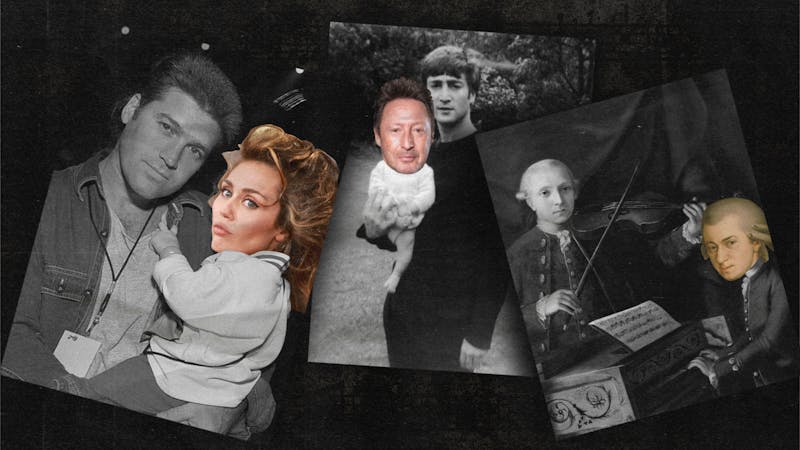“Nepo baby: How could two little words cause so much conflict? A baby is a bundle of joy; a nepo baby is physical proof that meritocracy is a lie. We love them, we hate them, we disrespect them, we’re obsessed with them.” —New York Magazine
You’ve certainly heard of the Hadid sisters, or perhaps grumbled over a rising star’s recent and undeserved success. Maybe you’ve dedicated several Pinterest boards towards achieving Hailey Beiber’s “clean girl” look, or transformed your closet to imitate Lily–Rose Depp’s street style. Besides their grasp on popular culture and Gen Z’s collective consciousness, there’s one thing all these figures have in common: famous parents.
In 2022, the internet made a groundbreaking discovery: Everybody is somebody’s kid, and everyone is in on it. While the existence of nepotism babies is nothing new, their pervasiveness in the entertainment industry has become a massive contemporary controversy. As they’ve grown in popularity, they’ve increasingly come under attack.
But there appears to be one genre of nepo baby in particular with a more deserving success rate: the musical kind. Musical talent seems to be transmitted across generational lines in ways that acting or modeling ability does not. This observation isn’t extended to just any silver–spooned children who pursue musical careers (I’m talking to you, Gracie Abrams), but specifically to artists with artist parents. In comparison to the nepo art photographers and luxury brand ambassadors of today’s world, these are fewer in number. Jeff Buckley and Norah Jones, for example, have succeeded in fulfilling the same musical ambitions as their parents before them, and with just as much finesse.
Musical nepotism is a phenomenon that dates back some 300 years. Mozart started his composer career because his father Leopold was also a musician and recognized his talent. Bach succeeded generations of composers: his father Johann Amrosius and his grandfather Christoph too—the list goes on.
Musical ability is an obvious thing. Unlike in other cases of nepotism—from within and beyond the entertainment industry—talent is an absolute necessity. Take one of the most famous names in semi–recent musical history: Lennon. To be the son of a Beatle is an unfathomable legacy. While Julian Lennon had some luck with his 1984 hit “Too Late for Goodbyes,” he remains a relatively little–known songwriter and photographer. Sean Ono Lennon (perhaps he can thank both his surnames) has taken a slightly more successful avant–garde route with his musical journey. Neither is a household name. Even while wielding the most famous surnames in music, little is guaranteed besides a callback. Why? Because we attach a unique value to musicianship.
While it’s obvious that meritocracy in the media is a myth—talent alone is not always sufficient for success—there’s also little room for mediocrity. Nobody ever doubts the credibility of Miley Cyrus’ career—despite her clear inside track to the entertainment industry via her ubiquitous Hannah Montana persona and country icon dad Billy Ray. There is little doubt that she is deserving of her contemporary musical successes—the singer recently won her first–ever Grammy. Perhaps in our thirst for authenticity, we turn our noses up at anyone less impressive than their genetic predecessor. In a way, the expectations for nepo babies of the musical persuasion are a whole lot steeper than for ordinary musicians, thanks to the standard of excellence set by their parents.
This standard is applied even to those born wielding a six–string. If the power to create is a skill, although that skill may be heritable, it must also be honed. Having musical parents is an advantage that extends beyond the automatic record deal: it provides unique opportunities for exposure, mentorship, and early development that can significantly enhance a budding artist’s musical abilities. A cultural and scholastic inheritance occurs within these households, and the result is a talent that is difficult to fake.
While music, like any art form, is subjective, it demands a more specialized substance. Technical proficiency, stage presence, and adaptability are elements essential to the success of any musician, including those with an advantageous upbringing. The results also fall on the ears of millions. Any nepo baby can get a record deal, but can they all back up their endowment with revenue?
The biggest difference between classical and contemporary music is democracy—a factor that holds little weight in motion pictures and fashion magazines but is everything within the modern music industry. People know what they want, and buy what they want, and as such, the power to delegate musical opportunities falls in the hands of the consumer. Present–day artists—self–made and nepotistic alike—are forced to bend to the whims of their audience, at least at the outset of their careers.
While the debate around nepotism babies in entertainment rages on, with the world running amok with manufactured talent, it’s tougher than ever to bluff musical prowess. Even those born into a musical dynasty have to earn their stripes, despite the exposure and mentorship provided by their parents. At the end of the day, the demands for musical stardom are non–negotiable—a high standard for success, and a small victory for meritocracy in today’s entertainment industry. But we’ll take what we can get.





